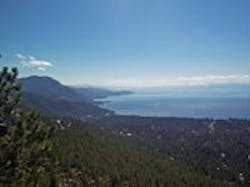Lake Tahoe "State-of-the-Lake" Report Released
Researchers with the University of California (UC) Davis Tahoe Environmental Research Center released a "state-of-the-lake" report regarding Lake Tahoe Wednesday. The report points to increasing water temperature and decreasing clarity.
"Overall, the most striking data in the inaugural report are those showing that the Tahoe climate is warming up," said a joint statement released by UC Davis scientists. "This trend could have profound implications for the natural features that make Tahoe a popular international vacation destination: snowfall in winter and the beautiful cobalt-blue lake in summer."
A higher lake tempertaure could limit the amount of winter mixing that makes the lake's surface water clear, according to Geoff Schladow, director of the US Davis Tahoe Environmental Research Center. Schladow said the theory needs further study.
The report stated that Lake Tahoe's clarity decreased 4.6 ft in 2006. The lake's clarity measurement, or Secchi depth, is the lowest is has been in six years; the decrease is largely due to high levels of precipitation in 2006 and the resulting runoff and stream flow, according to the report.
"We expected a decrease because 2006 was an extraordinary year for runoff, Julie Regan, spokeswoman for the Tahoe Regional Planning Agency, said Wednesday. The increased amount of runoff reaching the lake contains predominantly nutrients and fine sediments.
The precipitation for the basin was 48.4 in. in 2006, 84 percent higher than the annual average of 26.3 in. measured from 2001 through 2005, according to a UC Davis press statement.
"We're hoping for an improvement in 2007, but the Angora fire is creating a huge unknown," said Regan. The fire's impact will depend on the severity of 2007 storms and the effectiveness of erosion control measures that have been implemented since the fire was extinguished.
"The loss of clarity is disappointing, 4.6 ft is not an insignificant number," said Rochelle Nason, executive director for the League to Save Lake Tahoe advocacy group. "It's a matter of concern, but we know that this is a long-term issue, and we should not overemphasize a single year's results."
The Tahoe report is avaiable at http://terc.ucdavis.edu.
Source: Nevada Appeal


